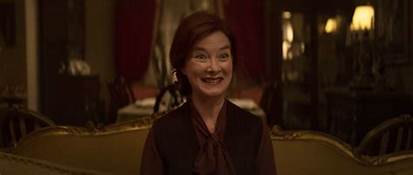Click here for the flashback interview with Azazel Jacobs and Creed Bratton for TERRI.
FRENCH EXIT is a deft comedy that is low key but also pointed and deeply affecting, despite concerning itself with the trials and tribulations of a woman who has raised superficiality and self-absorption to a high art.

Michelle Pfeiffer
That would be Frances (Michelle Pfeiffer), a formerly fabulously wealthy widow whose general insouciance about all things financial has left her without funds. When her financial advisor and no-so-secret admirer (Tracy Letts) breaks the news to her that the inevitable has happened, she finds solace by standing in the dark and sharpening a kitchen knife because the sound is so arresting. What would be the end for most women who have never worked a day in their lives becomes, as Frances puts it, the impetus for a coda. Selling off her jewels, art, and rare books, she takes flight to the Paris apartment of her best friend, Joan (Susan Coyne), with her son Malcolm (Ben Hedges) and black cat, named for her late husband) in tow. Her plan, such as it is, is to embrace a pseudo-retirement and when the money, that she has carefully stacked in her closet runs out, to commit suicide.
The mess of her life, however, becomes more than merely waiting for the Euros to vanish. She and Malcom are befriended by a lonely American widow, Mme. Renard (Valerie Mahaffey) with a secret in her freezer and a desperate need for noise in her life. Eventually, Frances’ circle includes the private detective (Isaach De Bankolé) hired to find Madeleine (Danielle Macdonald) the dyspeptic psychic Malcolm met, and bedded, on the voyage from America. Then Madeleine herself, and then Malcolm’s erstwhile fiancée (Imogene Poots) with her new, very straight-laced, boyfriend (Daniel di Tomasso) in tow.
That they all find themselves unquestioningly living under Frances’ borrowed roof is part of writer/director Jacob Azazael’s mannerist style that also includes dialogue as dense prose that is somehow never stilted while also being deliberately artificial. There is music in the way the cast deliver their lines, combining spontaneity with careful dialectics, from Mme. Renard’s musings on the nature of friendship to Frances’ re-evaluation of the cliché as told and as lived, this is a philosophical exercise that extrapolates one woman’s refusal to take reality at face value into a metaphysical manifesto about life and death.
At its center is Pfeiffer, the embodiment of arrogant ennui who has waited until the end of her life to do the examining of it that Plato requires. Her Frances is a woman who knows who she is and accepts it, whatever the consequences. She is not kind, but she is honest, with a drink in one hand, a cigarette in the other, and exactly the correct barb for any situation. She is mesmerizing, daring the viewer to dislike her while coolly aware that it will never happen, even when she cuts the fragile Mme. Renard to shreds. Brought to heel by Malcolm during their first visit to Mme. Renard’s apartment, the subsequent apology is as honest as the sarcasm. Endearing isn’t the right word, but perhaps there isn’t one in English for the empathy that she engenders even when she skulks around her borrowed apartment in a caramel-colored velvet dressing gown, passively, even impatiently waiting for the money to disappear into over-tipping and impulsive generosity. Perhaps it’s the way she also finally buys her adult son a bicycle, or out-condescends a French waiter using only style, smarts, and a small vial of perfume.
examining of it that Plato requires. Her Frances is a woman who knows who she is and accepts it, whatever the consequences. She is not kind, but she is honest, with a drink in one hand, a cigarette in the other, and exactly the correct barb for any situation. She is mesmerizing, daring the viewer to dislike her while coolly aware that it will never happen, even when she cuts the fragile Mme. Renard to shreds. Brought to heel by Malcolm during their first visit to Mme. Renard’s apartment, the subsequent apology is as honest as the sarcasm. Endearing isn’t the right word, but perhaps there isn’t one in English for the empathy that she engenders even when she skulks around her borrowed apartment in a caramel-colored velvet dressing gown, passively, even impatiently waiting for the money to disappear into over-tipping and impulsive generosity. Perhaps it’s the way she also finally buys her adult son a bicycle, or out-condescends a French waiter using only style, smarts, and a small vial of perfume.
Echoing the screwball comedies of an earlier era, FRENCH EXIT defies convention as adroitly as Frances herself. Unpredictable at every turn, absurdly funny, and intellectually audacious, FRENCH EXIT is a bracing experience that is never anything less that divine.
Your Thoughts?